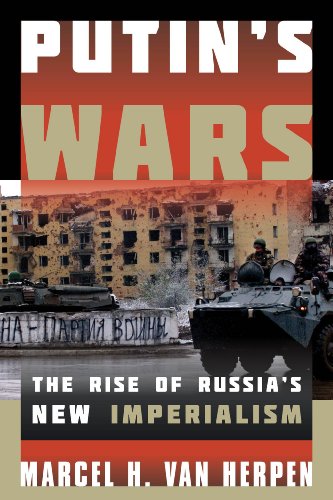Verwandte Artikel zu Putin's Wars: The Rise of Russia's New Imperialism

Zu dieser ISBN ist aktuell kein Angebot verfügbar.
Alle Exemplare der Ausgabe mit dieser ISBN anzeigen:
Críticas:
That the Russia-West relationship has been deteriorating since Vladimir Putin came to power has commanded scholarly as well as political attention. Edward Lucas's The New Cold War (2008) is among the earliest analyses of the glide into confrontational politics. Van Herpen contributes to this discourse by focusing on a specific aspect of Moscow's challenge to the West: Russia's 'new imperialism.' He takes a comprehensive approach to his argument, considering the historical as well as political and cultural contexts of Putin's effort to maintain dominance within a sphere of influence encompassing the former Soviet Union. Among other things, van Herpen describes the organizational devices used by Moscow for this purpose, including the Eurasian Union, and the ambitious Collective Security Treaty Organization. Use of coercive measures as well as force to maintain a sphere of influence is the subject of nearly half of the book, which includes an overview of the two Chechen Wars and a detailed account of the Russian-Georgia War. The author ends with a consideration of the 'Kremlin's obsession with Ukraine.' Most timely! The book is recommended as a well-documented, well-argued, and strong criticism of Moscow's foreign policy. Summing Up: Recommended. General readers, undergraduate students, graduate students, and research faculty. CHOICE Van Herpen asserts in a timely new book, Putin's Wars, that the Russian leader deliberately launched two wars after coming to power in 1999, first in Chechnya and then in Georgia, and that his relative success in both led directly to his current drive to dismember Ukraine. ... Drawing on a wide variety of Russian sources, Van Herpen documents how Russia's FSB intelligence agency, under Putin's direction, staged a series of explosions directed against civilian targets in Moscow and other cities. He notes that no Chechen has ever been put on trial for the bombings of apartment buildings, and the parliamentary commission set up to investigate the attacks had to stop its work because of a lack of cooperation from the Russian government. McClatchy News Bureau Did the Ukraine crisis reveal Russia's imperial ambitions? Has it brought the specter of geopolitics back onto the center stage of its relationship with the West? This book, written before Russia annexed Crimea, provides outright answers. Marcel Van Herpen...convincingly foretells the current crisis. He does so first by comparing empire-building to expose Russia's historical 'genetic makeup.' In contrast to West Europe, where dissolution of empires was definitive and irreversible, Russian decolonization was immediately followed by re-colonization, as vividly shown in the Bolshevik revolution's aftermath. Van Herpen then points to another historical trait: periods of Russian imperial expansion tended to have a negative impact on internal reform and democratization. He puts Putin's re-imposition of authoritarianism in the political system in this context and interprets it as an internal war on political and economic reforms in order to pursue external expansion. Russia's imperial ambition is further illustrated by a series of Putin's wars in Chechnya and Georgia that consolidated his position, legitimized his power and let him roll back democratic reforms. Thus, Van Herpen concludes that Russian neo-imperialism is an ongoing project. Global Asia Van Herpen's work is incisive: He persuasively argues that the Russian Federation is both a post-imperial state and a pre-imperial state that seeks to expand its control over much of the former Soviet empire. Ukrainian president Viktor Yanukovych's decision in late November 2013 not to sign an association accord with the European Union may soon test that thesis-if Russia and the EU continue to battle it out for predominant political-economic influence over the country, unable to reach a compromise. -- Hall Gardner, author of NATO Expansion and US Strategy in Asia
Reseña del editor:
This book offers the first systematic analysis of Putin's two wars, placing the Second Chechen War and the War with Georgia of 2008 in their broader historical contexts. Drawing on extensive original Russian sources, Marcel H. Van Herpen analyzes in detail how Putin's wars were prepared and conducted and why they led to allegations of war crimes and genocide. He shows how the conflicts functioned to consolidate and legitimate Putin's regime and explores how they were connected to a third, hidden, "internal war" waged by the Kremlin against the opposition. An essential book for understanding the dynamics of Putin's regime, this study digs deep into the Kremlin's secret long-term strategies. Readable and clearly argued, it makes a compelling case that Putin's regime emulates an established Russian paradigm in which empire building and despotic rule are mutually reinforcing.
„Über diesen Titel“ kann sich auf eine andere Ausgabe dieses Titels beziehen.
- VerlagRowman & Littlefield Publishers
- Erscheinungsdatum2014
- ISBN 10 144223136X
- ISBN 13 9781442231368
- EinbandTapa dura
- Anzahl der Seiten296
- Bewertung
(Keine Angebote verfügbar)
Buch Finden: Kaufgesuch aufgebenSie kennen Autor und Titel des Buches und finden es trotzdem nicht auf ZVAB? Dann geben Sie einen Suchauftrag auf und wir informieren Sie automatisch, sobald das Buch verfügbar ist!
Kaufgesuch aufgeben
